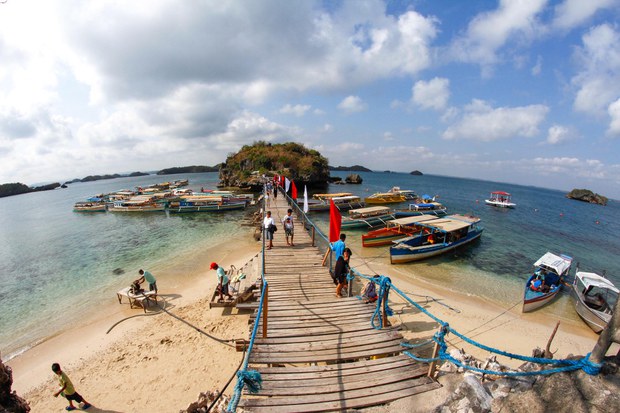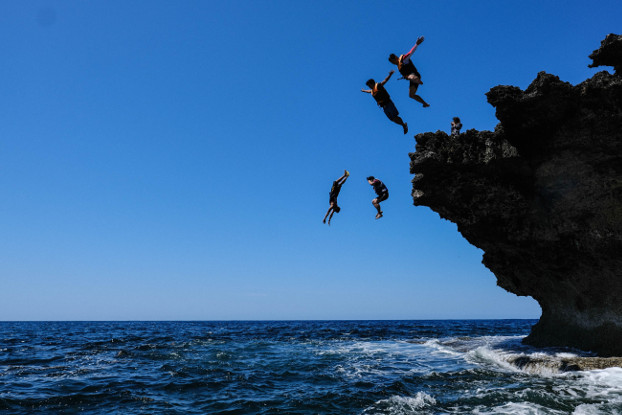Philippines Eases COVID-19 Hotel Restrictions, Foreign Travel Ban
2020.10.21
Manila and Dagupan, Philippines
 Motorized boats used to ferry tourists are docked along the shore at the Hundred Islands National Park in Alaminos city, Philippines, May 5, 2020.
Motorized boats used to ferry tourists are docked along the shore at the Hundred Islands National Park in Alaminos city, Philippines, May 5, 2020.
The Philippines has eased tourism restrictions due to COVID-19 by allowing hotels in Manila and other areas to operate at full capacity under certain conditions, while also lifting a ban on non-essential foreign travel by Filipinos, officials said Wednesday.
The moves are intended to spur the nation’s economy and help local businesses – particularly in the tourism and services sectors – bounce back from devastating ripple effects brought on by the pandemic. The Philippines currently ranks second behind Indonesia among countries in East Asia with the highest numbers of confirmed cases and deaths from the novel coronavirus disease.
Tourism Secretary Bernadette Romulo-Puyat said her department had agreed to allow hotels to open at a “100 percent capacity” subject to management’s compliance with government safety guidelines.
The cabinet-level Inter-Agency Task Force (IATF) for the Management of Emerging Infectious Diseases gave her department the authority to determine whether hotels could re-open, she added.
“Along with this comes the need to ready the whole tourism value chain, which includes the accommodation, transportation and tour operation sectors,” Romulo-Puyat told reporters.
“Allowing the accommodation sector to operate at full capacity will be most welcomed by tourism’s workforce that has been greatly affected since the community lockdown.”
The government recently allowed limited travel to Boracay Island, a top tourist destination in the central Philippines, but the number of visitors has been discouraging, officials said.
The popular mountain city of Baguio is to be opened this week and the historic Ilocos Sur region, also in the north, is to be opened by November, tourism officials said.

Foreign travel
The travel restrictions “imposed to non-essential outbound travel of Filipinos” were lifted as of Wednesday as well, according to an advisory from the Bureau of Immigration. Still, those travelers are required to have approved visas, confirmed round-trip tickets, health travel insurance and must have tested COVID-19 negative 24 hours prior to departure, it said.
“There have been only a few travelers,” immigration spokeswoman Dana Sandoval told BenarNews, adding that the bureau was checking the numbers.
Immigration Commissioner Jaime Morente said outbound and inbound travelers must meet government regulations.
“Outbound tourism is now allowed for Filipinos, subject to compliance with protocols set by the IATF,” Morente said in a statement on Wednesday.
Inbound Filipino travelers and their spouses and children holding tourist visas are allowed to enter the country, subject to certain conditions, he said. Filipino children with special needs, foreign parents of minor children and foreign parents of Filipino children with special needs will be allowed to enter as well.
Cabinet Secretary Karlo Nograles said those eligible to enter the country are required to secure an entry visa from Philippine embassies or consulates, prior to their departure.
Also, accredited foreign government and international organization officials and their dependents, foreign airline crew members, foreign seafarers with visas and foreigners with long-term visas will be allowed to enter the country.
“We ask for your patience, we ask for your kind understanding. The government listens to all the concerns of our countrymen and works to find ways to address them,” Nograles said.
“These go through a process. We assure you that we listen to and act on all your requests,” he said.
The nation has been under various stages of a lockdown since March because of the pandemic. Authorities have said restrictions led to a recession fueled by massive job losses amid forced shutdowns of many companies in the services sector.
The moves announced by the Philippine government on Wednesday came two days after it approved shortening the overnight curfew in Metro Manila, from 10 p.m. to 5 a.m. to midnight to 4 a.m.
The Philippines logged 1,509 new cases of COVID-19 on Wednesday, bringing the total cases nationwide to 362,243. The Philippines also recorded 60 deaths, bringing the toll to 6,747, according to data from the health department.
Globally, more than 40.9 million COVID-19 infections and more than 1.1 million deaths have been recorded, according to disease experts at U.S.-based Johns Hopkins University.








